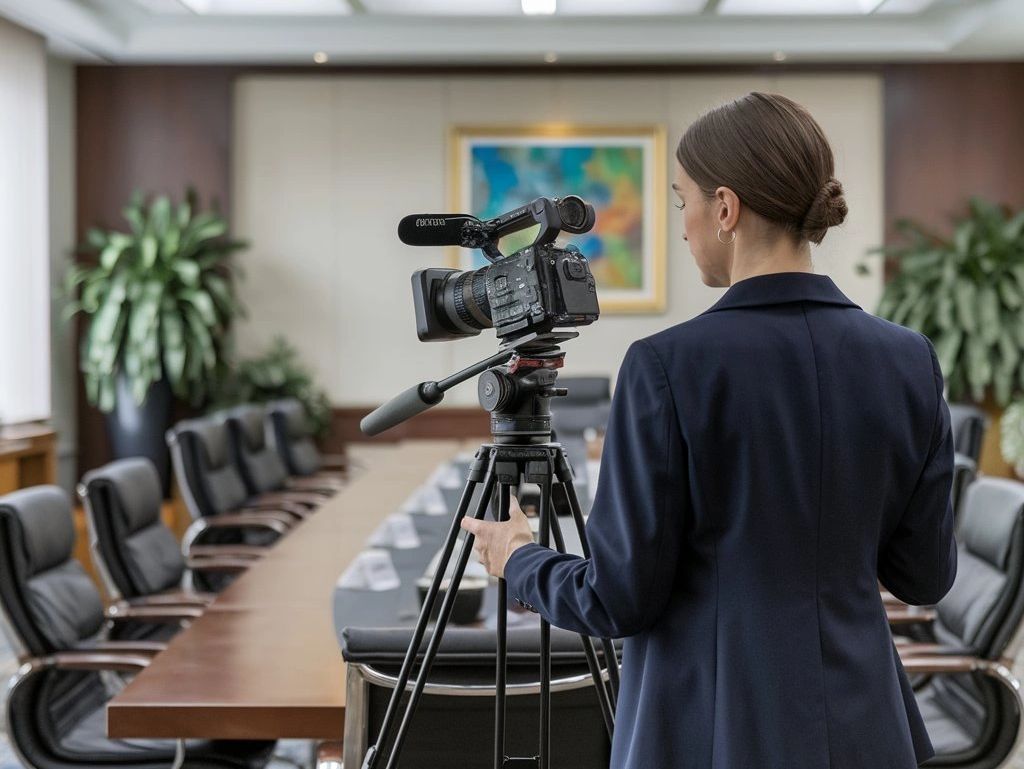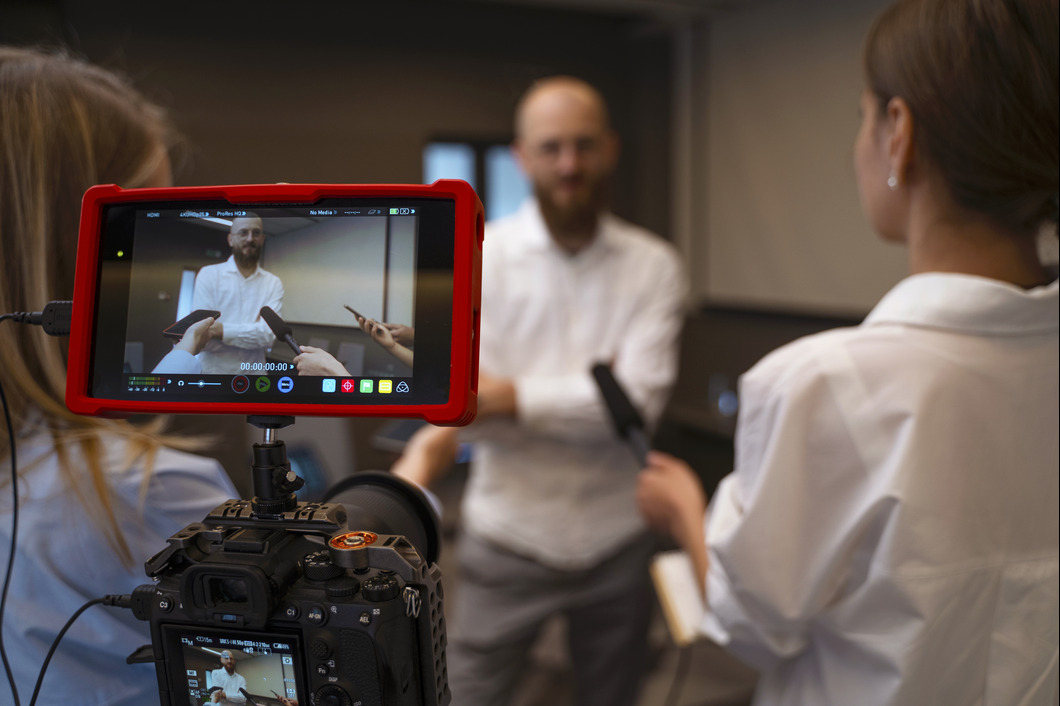The Value of Legal Video Clip Depositions in Modern Legal Solutions: What You Need to Know
Legal video clip depositions have actually come to be necessary in today's lawful landscape. They offer a multidimensional view of witness testimonies that typical records simply can not match. By capturing both non-verbal and verbal communication, these depositions boost the general understanding of a witness's reputation. Nonetheless, the efficiency of video depositions rests on different factors, consisting of compliance with lawful requirements and best techniques (legal video depositions). Discovering these aspects discloses their true significance in modern-day legal solutions
What Are Lawful Video Clip Depositions?
Legal video depositions act as an essential device in the lawsuits process. They include recording witness statements in a video clip format, capturing both non-verbal and spoken communication. This technique permits lawyers to document the attitude, expressions, and responses of witnesses, providing a richer context for the statement. Commonly conducted in a controlled atmosphere, these depositions are led by lawyers that ask questions while a stenotype reporter records the discussion. The resulting video clip can be crucial for trial preparation, as it allows attorneys to analyze the reliability of witnesses and fine-tune their methods. In addition, lawful video clip depositions can be made use of in numerous lawful contexts, ranging from civil disputes to criminal cases. The auditory and visual elements of video depositions enhance the presentation of evidence, making it a vital element in the contemporary legal landscape. Generally, they contribute significantly to the effectiveness and efficiency of legal proceedings.

Benefits of Video Clip Depositions Over Typical Approaches
Video clip depositions use numerous advantages contrasted to traditional approaches of taking witness testaments. One substantial advantage is the capability to catch both visual and audio elements, providing a more thorough document of the witness's declarations. This double style enhances clarity and permits lawyers to reference specific subtleties throughout trial preparation. In addition, video clip depositions help with remote participation, making it easier for witnesses that may be unavailable for in-person looks due to geographical constraints or wellness issues.Moreover, video depositions can expedite the total deposition process, reducing the moment and expenses related to traveling and logistics. They likewise boost availability, as tape-recorded depositions can be easily shared amongst legal groups and referenced at any time. This convenience adds to better situation monitoring and prep work. Generally, video depositions stand for a modern, reliable approach to collecting witness testimonies, straightening with the progressing demands of the legal profession.
The Function of Body Movement and Tone in Testimonies

In lawful video depositions, body language and tone play crucial duties in conveying a witness's integrity and trustworthiness. Nonverbal hints can give understandings into a witness's mood, affecting just how their testimony is perceived. Comprehending the influence of these components is important for jurors and lawyers alike when reviewing the integrity of a testimony.
Nonverbal Communication Insights
While verbal communication is commonly stressed in lawful testaments, nonverbal cues such as body language and tone play a vital function in communicating reputation and feeling. Viewers of depositions might keep in mind that a witness's posture, motions, and face expressions can greatly influence perceptions of reliability. Regular eye contact may indicate confidence, while preventing look might suggest deceit or discomfort. The tone of voice-- its pitch, rate, and volume-- can pass on sensations of sincerity or unpredictability. Lawyers have to be attuned to these nonverbal signals, as they frequently supply crucial context that enhances talked words. Understanding these subtleties can boost the performance of depositions and influence the outcome of legal procedures.
Emotional Tone Effect
The psychological tone shared throughout lawful testaments greatly impacts exactly how a witness is regarded. Body movement, singing inflections, and faces play essential duties fit the story of a testament. A witness showing confidence via steady eye call and a tranquil tone can infuse a feeling of dependability and interaction. On the other hand, signs of anxiety, such as fidgeting or an unsteady voice, may lead to hesitation regarding their account. The nuances of emotional expression can affect the interpretation of facts, making it essential for lawyers to identify these cues. In video clip depositions, the acoustic and visual components integrate, emphasizing the relevance of psychological tone in conveying genuineness and reliability within the legal procedure.
Trustworthiness and Trustworthiness
A crucial consider developing reliability and dependability during statements exists in the witness's body language and tone of voice. Viewers often find rely upon non-verbal signs-- such as eye contact, pose, and motions-- to assess a witness's sincerity. For circumstances, a witness that maintains eye get in touch with and shows open body movement might be perceived as more reputable and sincere than one that stays clear of eye contact or appears shut off. Furthermore, intonation plays a crucial duty; a constant, tranquil tone you can look here can enhance the credibility of the testimony, while variations in pitch or quantity might increase questions. Eventually, the combination of body language and singing tone substantially affects exactly how a witness's statements are received and interpreted in a lawful context.
Ideal Practices for Carrying Out Video Depositions
Conducting video depositions calls for cautious planning and execution to guarantee a clear and reliable presentation of testament. First, it is essential to select a silent, well-lit place to minimize interruptions and safe and secure ideal video top quality. The equipment should be examined beforehand, consisting of video cameras, microphones, and lighting, to avoid technological problems throughout the deposition.Next, celebrations involved should assess the style and procedures ahead of time, making sure that everyone recognizes their roles. The deponent must be oriented on the process, consisting of just how to react plainly and concisely.Additionally, preserving an expert temperament throughout the session is vital. This consists of abstaining from talking over each other and validating that all questions are directed properly. It is crucial to record the deposition in a layout that enables for very easy playback and evaluation, maintaining the integrity of the testimony for future use.
Legal Considerations and Conformity Issues
Just how do legal factors to consider and conformity issues affect the efficiency of video clip depositions? Attorneys have to browse a complicated landscape of laws, making sure that video depositions stick to jurisdictional guidelines and standards. Compliance with legislations concerning privacy, consent, and tape-recording techniques is vital. For instance, getting specific approval from all events included is needed to prevent lawful repercussions.Additionally, the admissibility of video clip evidence in court can hinge on conformity with step-by-step requirements. Making sure that the equipment made use of satisfies technological criteria is likewise essential, as inadequate high quality can threaten the deposition's reliability.Moreover, attorneys must understand any type of certain state regulations that regulate video depositions, as these can differ significantly. Failure to attend to these considerations can not only jeopardize the honesty of the deposition but also influence the general situation approach, ultimately impacting the customer's lawful end results.
Just How Video Depositions Influence Jury Understanding
While video clip depositions can serve as effective devices in lawful process, their impact on jury assumption is significant. The visual and acoustic aspects of video recordings give jurors with an extra comprehensive understanding of witness demeanor, trustworthiness, and emotional reactions. This multimedia technique can boost the jurors' capability to assess the reliability of statement contrasted to standard text-based transcripts.Moreover, video depositions permit jurors to observe body movement, intonation, and facial expressions, all of which can impact their interpretation of the witness's declarations. The existence of a witness on display can humanize them, cultivating compassion and link, which might guide jurors' opinions. On the other hand, a witness that shows up evasive or unreliable on video might result in negative assumptions that affect a court's decision. Eventually, the dynamic nature of video clip depositions plays a crucial duty in forming exactly how jurors analyze proof and reach their decisions.
The Future of Video Depositions in Legal Method
As developments in technology remain to improve the lawful landscape, the future of video depositions is positioned for considerable advancement. Technologies such as fabricated intelligence, virtual fact, and boosted video conferencing tools are expected to improve the deposition process and enhance access. Lawyers might use AI-driven analytics to examine witness integrity and case strength a lot more effectively.Moreover, the assimilation of virtual fact can enable juries to experience immersive simulations of depositions, giving deeper context and visit our website understanding. Furthermore, the pattern towards remote depositions is likely to continue, supplying higher adaptability for attorneys and customers alike.As remote work becomes increasingly normalized, video clip depositions will likely come to be basic technique, lowering prices and time restraints connected with typical approaches. Overall, these technical improvements guarantee to improve the efficiency, efficiency, and availability of video depositions in legal method, ultimately changing how lawyers get ready for trial.
Frequently Asked Inquiries
Exactly How Much Do Legal Video Clip Depositions Normally Price?

Can Video Clip Depositions Be Utilized in Any Kind Of Instance?
Video depositions can be made use of in numerous sorts of situations, including civil, criminal, and family regulation. Their versatility allows attorneys to existing witness testimonies efficiently, adapting to the specific needs of various lawful scenarios.
What Equipment Is Needed for a Video Deposition?
To perform a video clip deposition, essential devices consists of a premium camera, microphone, lighting, and a dependable recording gadget. In addition, a computer with editing and enhancing software application may be needed for post-production and formatting the final video clip.
Just how Long Does a Regular Video Clip Deposition Last?
A common video clip deposition lasts between two to four hours, depending upon the intricacy of the situation and the variety of questions postured. Extended sessions might occur, yet breaks are generally incorporated for participant convenience.

Are Video Depositions Admissible in Court?
Video clip depositions are typically acceptable in court, given they stick to lawful standards and guidelines of proof. Their usage enhances clearness and protects witness testimony, assisting in the judicial process during trials and hearings. Lawful video depositions have actually ended up being essential in today's lawful landscape. Additionally, legal video clip depositions can be utilized in different lawful contexts, varying from civil disagreements to criminal situations. Additionally, video depositions facilitate remote engagement, making it less complicated for witnesses that might be not available for in-person appearances due to geographical constraints or health issues.Moreover, video depositions can accelerate the general deposition process, reducing the time and prices associated with traveling and logistics. Ensuring that the tools made use of fulfills technical standards is likewise important, as bad quality can threaten the deposition's reliability.Moreover, lawyers should be aware of any type of specific state legislations that regulate video clip depositions, as these can vary considerably. Furthermore, the trend toward remote depositions is likely to continue, supplying higher versatility for clients and attorneys alike.As remote work becomes progressively normalized, video clip depositions will likely become basic technique, minimizing costs and time constraints associated with typical techniques.